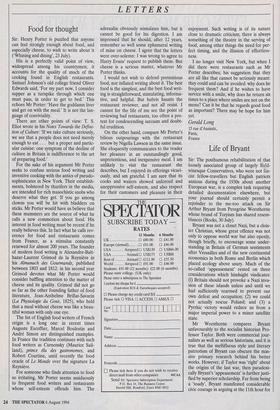LETTERS Food for thought
Sir: Henry Porter is puzzled that anyone can feel strongly enough about food, and especially cheese, to wish to write about it (`Whining and dining', 23 July).
His is a perfectly valid point of view, widespread among his countrymen; it accounts for the quality of much of the cooking found in English restaurants. Samuel Johnson's old college friend Oliver Edwards said, 'For my part now, I consider supper as a turnpike through which one must pass, in order to get to bed.' This echoes Mr Porter: 'Have the goddamn liver and get on with the meal.' It is not the lan- guage of conviviality.
There are other points of view: T. S. Eliot wrote in his Notes Towards the Defini- tion of Culture: 'If we take culture seriously, we see that a people does not need merely enough to eat . . . but a proper and partic- ular cuisine: one symptom of the decline of culture in Britain is indifference to the art of preparing food.'
For the sake of his argument Mr Porter seeks to confuse serious food writing and inventive cooking with the antics of pseudo- sophisticates in New York. Their establish- ments, bolstered by thurifers in the media, are intended for rich masochistic snobs who deserve what they get. If you go among clowns you will be hit with bladders on sticks. Mr Porter would have us believe that these mummers are the source of what he calls a new commotion about food. His interest in food writing must be recent if he really believes this. In fact what he calls rev- erence for food and restaurants comes from France, as a stimulus constantly renewed for almost 200 years. The founder of modern food writing is Alexandre-Balt- hazar-Laurent Grimod de la Reyniere in his Almanach des Gourmands, published between 1803 and 1812: in his second year Grimod devotes what Mr Porter would consider baffling attention to the matter of cheese and its quality. Grimod did not go so far as the other founding father of food literature, Jean-Anthelme Brillat-Savarin (La Physiologie du Gout, 1825), who held that a meal without cheese was like a beau- tiful woman with only one eye.
The list of English food writers of French origin is a long one: in recent times Auguste Escoffier, Marcel Boulestin and Andre Simon are distinguished examples. In France the tradition continues with such food writers as Curnonsky (Maurice Sail- land), prince elu des gastronomes, and Robert Courtine, until recently the food oracle of Le Monde over the signature La Reyniere.
For someone who finds attention to food so irritating, Mr Porter seems assiduously to frequent food writers and restaurants whose self-esteem offends him. The adrenalin obviously stimulates him, but it cannot be good for his digestion. I am impressed that he should, after 12 years, remember so well some ephemeral writing of mine on cheese. I agree that the letters were over-solemn: I was wrong to agree to Harry Evans' request to publish them. But cheese is a serious matter, whatever Mr Porter thinks.
I would not wish to defend pretentious food, nor inflated writing about it. The best food is the simplest, and the best food writ- ing is straightforward, stimulating, informa- tive, and helpful. But hubris haunts the restaurant reviewer, and not all resist. I cannot for the life of me see the point of reviewing bad restaurants, too often a pre- text for condescending sarcasm and doubt- ful erudition.
On the other hand, compare Mr Porter's bilious outpourings with the restaurant review by Nigella Lawson in the same issue. She eloquently communicates to the reader her pleasure in an outstandingly good, unpretentious, and inexpensive meal. I am unlikely to visit the restaurant she describes, but I enjoyed its offerings vicari- ously, and am grateful. I am sure that its cooks and waiters showed unforced and unoppressive self-esteem, and also respect for their customers and pleasure in their enjoyment. Such writing is of its nature close to dramatic criticism; there is always something of the theatre in the serving of food, among other things the need for per- fect timing, and the illusion of effortless- ness.
I no longer visit New York, but when I did there were restaurants such as Mr Porter describes; his suggestion that they are all like that cannot be seriously meant: they could and can be avoided: why does he frequent them? And if he wishes to have service with a smile, why does he return six times to a place where smiles are not on the menu? Can it be that he regards good food as important? There may be hope for him yet.
Gerald Long 15 rue d'Aumale, Paris,
France


















































 Previous page
Previous page